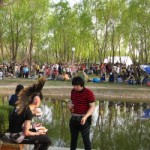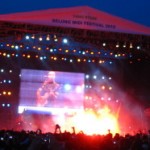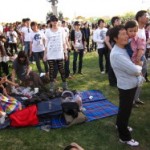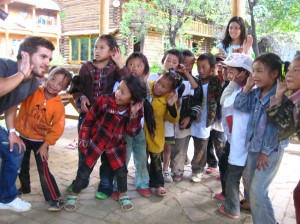 by Cathy Barbash
by Cathy Barbash
While the cultural diplomacy “establishment” organizations still appear to favor recognizing large brand name projects over “indies,” (see recent announcement of the U.S. Center for Citizen Diplomacy’s International Cultural Engagement Task Force’s selections for recognition at the 2010 U.S. Summit And Initiative For Global Citizen Diplomacy), young Americans continue to create true grass-roots citizen cultural diplomacy initiatives fueled by their passion and support of family, colleagues and friends. The Unity Rural Music Project in China is one of them.
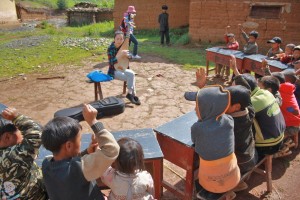
The Unity Rural Music Project is barely seven months old, but already flourishing. Created in February 2010 by two Fulbright scholars David Borenstein and Jon Kaiman, it was inspired by Borenstein’s research on how the mass migration of young people from the countryside to cities affects rural life. He recognized the poverty of resources to engage youth in any way, and was ultimately approached by neighbors who knew he was a musician to play for and teach their children.
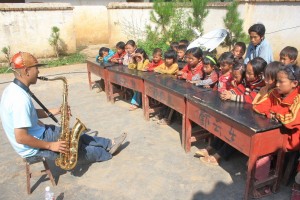 Their mission is to address issues of education development in rural China by organizing a series of music-themed summer camps in Sichuan and Guangxi Provinces. Through these camps, they will provide participating schools with instruments, textbooks and teacher training, helping them lay the foundation for sustainable music programs of their own. You can follow their progress at unityrmp.wordpress.com.
Their mission is to address issues of education development in rural China by organizing a series of music-themed summer camps in Sichuan and Guangxi Provinces. Through these camps, they will provide participating schools with instruments, textbooks and teacher training, helping them lay the foundation for sustainable music programs of their own. You can follow their progress at unityrmp.wordpress.com.
Their first effort was a tour by the US Afro-Latin Band, Los Piratas Del Monte. Working alongside four different local NGOs, the project organized a series of six one-day Latin music camps at Chinese rural schools. The group held events at a vocational school for orphans 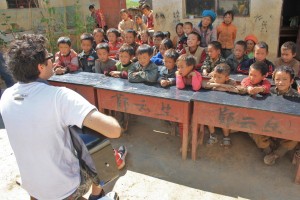 and others affected by the 2008 Wenchuan earthquake, several schools located at the earthquake epicenter that were destroyed by the quake, a school sponsored by the YMCA, and other schools in low-income areas. Camp content featured classes in three different styles of Latin dance, percussion, and singing (merengue, son and cumbia). The camps culminated in an interactive performance where campers took turns performing with the band—making use of the percussion, dance, and singing styles they learned during the day.
and others affected by the 2008 Wenchuan earthquake, several schools located at the earthquake epicenter that were destroyed by the quake, a school sponsored by the YMCA, and other schools in low-income areas. Camp content featured classes in three different styles of Latin dance, percussion, and singing (merengue, son and cumbia). The camps culminated in an interactive performance where campers took turns performing with the band—making use of the percussion, dance, and singing styles they learned during the day.
Alas, two workshops scheduled for Guanxi province this week have been canceled because of dangerous flooding conditions in the province.
On 8/5, the project continued with two four-day music camps in the villages surrounding Lugu Lake 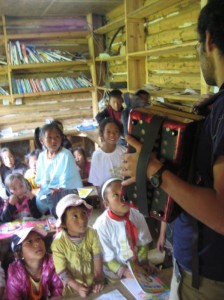 in southern Sichuan Province. In addition to Los Piratas Del Monte, past and present Fulbright scholars, a PhD student in ethnomusicology and a professional Pipa player from Chengdu all volunteered to teach. For the first three days at each camp, campers attend five 45-minute long classes: Latin music, American folk, popular music, Chinese classical and jazz. On the fourth day, they showcased what they’d learned in a village-wide performance. The project will also be donating resources to the schools, including percussion sets and teacher stipends, to help them lay the foundation for extracurricular music programs of their own.
in southern Sichuan Province. In addition to Los Piratas Del Monte, past and present Fulbright scholars, a PhD student in ethnomusicology and a professional Pipa player from Chengdu all volunteered to teach. For the first three days at each camp, campers attend five 45-minute long classes: Latin music, American folk, popular music, Chinese classical and jazz. On the fourth day, they showcased what they’d learned in a village-wide performance. The project will also be donating resources to the schools, including percussion sets and teacher stipends, to help them lay the foundation for extracurricular music programs of their own.
Full disclosure: I was so moved by this project that I made what I call a “micro-grant” to support it.
Messrs. Borenstein and Kaiman are not alone in their dedication. Last May, Philadelphia Orchestra violinist Phil Kates returned to Du Jiang Yan Tian Ma Primary School, also in the earthquake stricken zone nearby Chengdu. Accompanied by three of his Orchestra colleagues, they performed for students and inspected the music classroom that the Orchestra’s donations had helped to fund since his first visit just after the devastating Wenchuan earthquake in 2008.
 And Americans are not the only grass roots cultural activists. Through Mary Sue Fields of the U.S. Consulate Chengdu, I’ve learned of an Italian, Luca Silipo, who is running a non-profit association out of Hong Kong called Music for the Growing Mind. They have received permission from local officials in two cities near Chengdu to start an El Sistema program there for youth affected by the earthquake, but are finding fundraising a challenge. For more details on that program, see http://www.musicgrowingmind.org.
And Americans are not the only grass roots cultural activists. Through Mary Sue Fields of the U.S. Consulate Chengdu, I’ve learned of an Italian, Luca Silipo, who is running a non-profit association out of Hong Kong called Music for the Growing Mind. They have received permission from local officials in two cities near Chengdu to start an El Sistema program there for youth affected by the earthquake, but are finding fundraising a challenge. For more details on that program, see http://www.musicgrowingmind.org.






